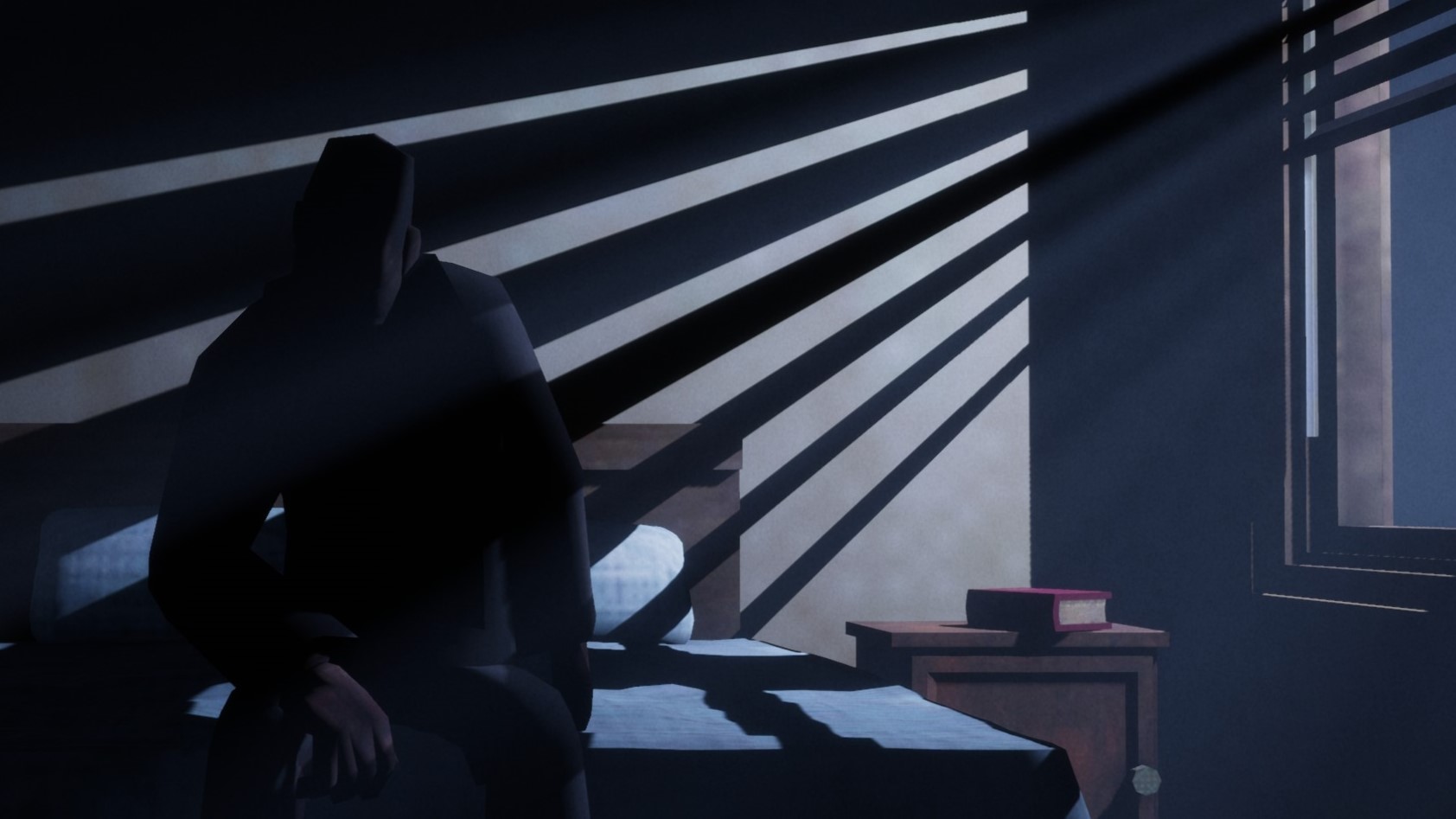El Paso, Elsewhere is a videogame-ass videogame. Its features wouldn’t be out of place scrawled across an OG PlayStation game’s back cover:
50 levels of intense action! Seven powerful weapons!An army of the undead to blast back to hell!More lurid colored lighting than you can shake an LED array at!
While it may draw from Max Payne for its core combat loop (slow-mo diving and akimbo pistols on tap), this looks and feels like a game from a bygone era in so many ways.
So it should feel contradictory, jarring, even, that it is also one of the freshest, most cutting-edge indie releases of this jam-packed year. It is a modern gothic love story, with gut-wrenchingly good writing and voice acting carrying a script that would be overwrought in any other context. It is a heartfelt and personal dive into the world of bad breakups and cycles of abuse, accompanied by a huge high-energy soundtrack (80+ songs, all bangers) including an entire bespoke horror-themed hip-hop album.
This mashup feels like a disaster in the making, like injecting the most philosophically resonant moments of Disco Elysium into a classic Quake deathmatch then bunny-hopping and rocket-jumping your way to self-realization. It sounds like a joke. It absolutely should not work. But it does and I need to gush about why it works, and how El Paso, Elsewhere achieves its impossible thematic alchemy through 7-8 hours of running and gunning.
This is a deeply old-school game. Early ’90s, even ’80s in ways. Levels float in an abstract void, starting and ending at an elevator. Grab weapons and ammo, blast monsters and rescue hostages that you can (literally) see a mile off thanks to each of them beaming a pillar of light into the (almost) always-visible sky. Grab all the people, and the sky turns red and angry, more enemies spawn, and you make your way to the exit. Rinse and repeat 50 times.
The story could have so easily been as simple as that central loop. Paranormal-researcher-turned-monster-slayer James Savage is here to kick ass, take names and shoot monsters in slow motion while rescuing hostages taken for sacrifice by Draculae, Lord of the Vampires. Problem is, Draculae is James’ ex, and they’ve got a lot of post-breakup angst to work out. Again, it sounds like a joke, but it’s delivered with absolute sincerity (although still finds the time to crack wise now and then), and I don’t think many other developers could have pulled it off.
(Image credit: Strange Scaffold)
(Image credit: Strange Scaffold)
(Image credit: Strange Scaffold)
(Image credit: Strange Scaffold)
(Image credit: Strange Scaffold)
(Image credit: Strange Scaffold)
(Image credit: Strange Scaffold)
(Image credit: Strange Scaffold)
(Image credit: Strange Scaffold)
Strange Scaffold are a small indie outfit headed up by Xalavier Nelson Jr, a man quickly closing in on being credited in two dozen games, most of those as writer (disclosure: Nelson Jr. is a former freelance columnist for PC Gamer magazine). He and his team are quickly becoming experts at extracting pathos from bizarre concepts. Case in point: An Airport For Aliens Currently Run By Dogs, which balances its surreal goofs with the pains and challenges of maintaining a long-distance relationship. It felt personal.
El Paso, Elsewhere goes further—it feels like Xalavier has poured his soul into it, acting as writer, director, voice actor (for both the brooding protagonist and another key role that I won’t spoil) and even lead singer in the vocal tracks. While credit goes to the whole of Strange Scaffold (especially musical powerhouse RJ Lake), it’s hard to shake the feeling that this is Xalavier’s game. Fantastical as the framing is, the breakup in El Paso feels all too real. Regrets and warning signs are ignored amidst a series of sweet, often-funny memories, which you get to experience thanks to the eldritch murder-void pulling its ideas for level design, narrative and monsters from both James’ and Draculae’s deep well of happy and traumatic memories.
One minute you’re in a gothic manor, unveiling the vampire’s tragic origins. Next, you’re listening to a memory of her playfully quizzing James on how The Transformers work and whether/how the car-robots have sex. There are surreal asides about true crime podcasts, a noir parody radio show called Pill Cop that goes cartoonishly off the rails, and then the game snaps back to painfully real dialogue as the grim couple confront each other, carelessly tearing open deep emotional wounds, dodging blame and making everything uncomfortably real once more.
The subject matter flies close to the sun—risking painful awkwardness throughout—but manages to hold it together all the way to the end.
The running and gunning here is great (if simple) fun, and the abstract, intentionally fractured level design makes for some very fun sequences and thematic shifts, but it’s that deep personal drama that left me itching for the next line of dialogue, lent additional weight and energy by the soundtrack. Every level, setpiece and cutscene gets its own accompaniment, and as great as it all fits in context, it’s eminently listenable by itself. It elevates an already great experience.
El Paso, Elsewhere is a beautiful, fragmented anomaly of a game. Fun, fast, and eerily capable of dredging up long-buried resonant memories of every poor relationship decision you’ve ever made.











